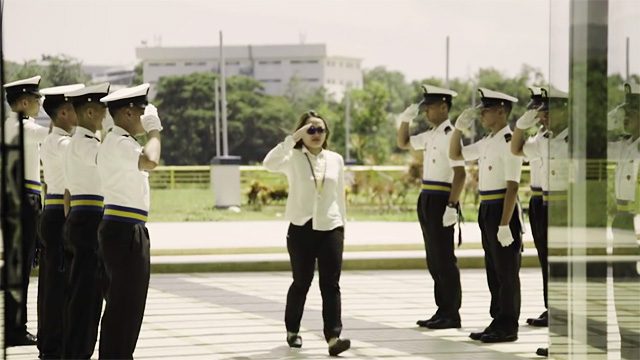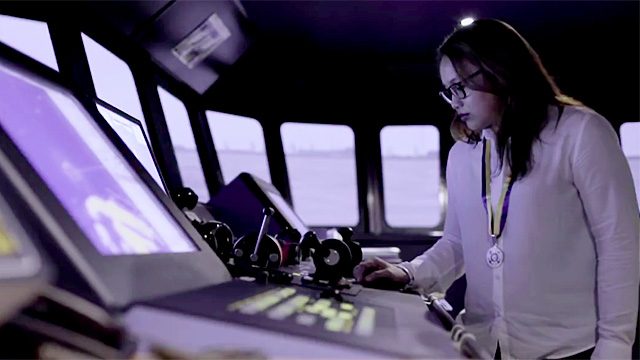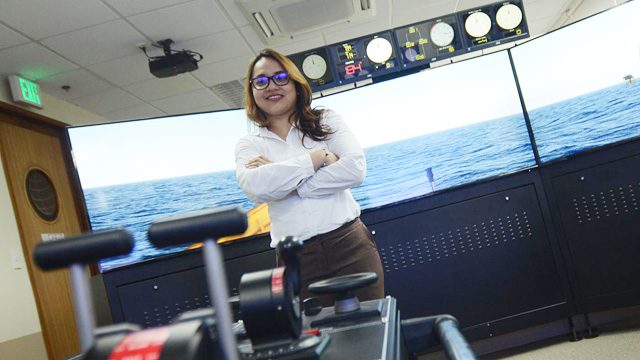SUMMARY
This is AI generated summarization, which may have errors. For context, always refer to the full article.

MANILA, Philippines – It’s a warm Thursday afternoon, but the gray lobby of the ASEANA II is cool and quiet. It is filled with men. The elevator, too, is filled with men. The hallway on every floor is filled with men. There seems to be no woman in this sea of men.
Most of them are in casual clothes and carrying brown envelopes. Some are trim in navy-and-white uniforms, sporting identical crew cuts. They are all seafarers: Overseas Filipino Workers who spend weeks on the waters, aboard hulking steel vessels that contain construction materials, goods, or passengers.
At the 10th floor, finally, there is a woman – a receptionist at the International Maritime and Offshore Safety Training Institute. She smiles and says, “Please wait for a while.”
A door opens. Another woman appears. She has long brown hair and glasses, and she is wearing a uniform like the men in the lobby and elevator and hallways. This is Jasmin Labarda, and she is only the 3rd woman to earn a Master Mariner’s license in the Philippines. This means that she is only one of very few women in the country – and in the world – who can navigate the oceans, command a vessel, and be called “captain of the seas.”
“Call me Jasmin,” she says.
A Seaman’s Daughter
Jasmin’s father, Ben, has been a seafarer since he was 17. Her younger brother, her uncles, and male cousins all worked in ships too.
Jasmin’s original plan was to tread a different path. “I really wanted to take up Engineering,” Jasmin says. She was all set to take the entrance exams at Mapua. But on the way home from the hospital one day, her mother Silvina saw a poster for a scholarship program being offered by the Maritime Academy of Asia and the Pacific. Silvina told Jasmin to apply.
“She’s obedient,” Her mother says, in Filipino. “Whatever her mother tells her, she follows.”
So Jasmin submitted an application to fulfill her mother’s wish. But right before the results were released, she found herself inside a chapel, at a loss on what to pray for.
“If I don’t pass, my mother would be disappointed,” Jasmin recalls in Filipino. “But if I pass, what would happen to my dreams?”
She passed the admission exam. “I told my Ma, ‘ayoko’ (I don’t want this),” Jasmin said. “But if I went to a different school, my parents would not be able to keep funding my education. I got the scholarship at MAAP. I wanted my siblings to have a good life. For me, it was clear what I wanted. That was my inspiration.”
Her father, Ben, was at sea when the results came in. They called him right away to deliver the happy news.
“Can your daughter handle it?” Ben had asked her mom over the phone.
“I raised her,” Silvina replied proudly.

Jasmin was only one of 4 women who graduated from the first batch of MAAP’s students. She was among the top 8 students in the whole class. At 17, she became a cadet and boarded a ship for the first time.
Ben’s first piece of advice to Jasmin was to befriend the cook. “So I would never go hungry,” she remembers with a laugh.
Silvina recalls how Ben did not really want his children to follow his footsteps. “He knows how hard it is,” she says. But times are different now. When Ben was a seaman, he would be gone for up to 9 months, and letters would be his only form of communication back home. Meanwhile, Jasmin gets to dock every 30 days, and it is easier to stay in touch.
When she’s at sea, the rest of her father’s sage wisdom was always just a phone call away. “If I have a problem, I ask him, ‘Papa is it really like this?’ One of the reasons I became strong was there was always someone guiding me. Someone listening. It’s a good thing to have someone [who is] understanding of what I do,” Jasmin says.
Ten years, thousands of miles, and many expeditions later, Jasmin would finally earn her Master Mariner’s license, placing 6th in the nationwide rankings.
Making waves
The Philippines is known as the world’s top supplier of seafarers, providing up to 25% of the demand for sea-manning crews around the world. According to data from the Philippine Overseas Employment Administration (POEA), sea-based workers made up 468,000 of the 2.2 million OFWs deployed in 2013. In a country that has one of the narrowest gender gaps in the world, the seafaring industry remains lamentably male-dominated. The International Labor Organization says that women officers and crew like Jasmin merely represent 2 percent of the world’s total number of seafarers.
“It’s hard. I experienced all possible kinds of discrimination,” Jasmin admits. In an earlier interview, she pointed out that if a man had to work thrice as hard to prove himself, a woman had to work 10 times harder. Seafaring is a physically demanding job that is supposedly more suited to men. Stints would last for months and mothers should not be away from home for that long. Most women seafarers are hired in cruise ships and ferries, and very few get to rise among the ranks. There are hardly any policies that protect against harassment, or provide for rights like maternity leaves. Individuals like Jasmin, however, are helping to slowly change the mindset.

“When I work in the ship, I never think of it as a man’s world,” Jasmin says. “If you see it as a man’s world, they own it. It means you’re an outsider. But that’s the challenge. You just get used to it.”
In Jasmin’s latest assignment, she is the Senior Dynamic Positioning Officer (DPO) and Chief Mate of the APACHE II, one of most reliable pipelay vessels hired by oil and gas companies around the world. As the first Filipino woman to hold a senior position in the offshore oil industry, there is tremendous pressure for Jasmin to excel on the bridge.
The APACHE II is a massive 10,300-ton ship that can lay rigid steel pipes in water depths of up to 1,500 meters. As the Senior DPO, Jasmin is in charge of controlling the highly technical computer system that runs this ship, ensuring the exact position and optimum circumstances for drilling in pipes thousands of fathoms beneath them. The smallest miscalculation can lead to the death of divers, uncontrolled oil spills, and millions of dollars in damage costs.

Being a pioneer comes with sacrifice. “I gave up a promotion in a conventional vessel to move here,” Jasmin explains. When she found out that she was the 3rd licensed woman Chief Mate in the Philippines, she realized that there could now be a 4th, a 5th, a 6th, and more. “Many will follow,” Jasmin said. “In maritime, there are many women, it’s already being taken care of. But here [in dynamic positioning], there’s hardly anyone.”
Still, Jasmin insists that she’s not quite there yet. “You’re still changing the culture there,” she says, referring to herself in the 2nd person. “You have a lot of obstacles that you have to hurdle or pass through. If I give up, that’s the end of the line again, it’s a battle lost again.”
First-rate
These days, Jasmin’s schedule has little leeway for rest. Aside from her Chief Mate duties, she’s also an instructor at IMOSTI and currently the youth representative of several women’s groups in local seafaring unions.
Most would be content with simply riding the wave of success, but Jasmin remains relentless and determined to do more. Keeping her afloat are her parents, who taught her to be hardworking, humble, and to never forget where she came from. Every time she leaves the shore, she keeps them updated through regular phone calls and emails. In another interview, she mentioned how irreplaceable they are; how she can always buy anything, but not family. Constant communication keeps her anchored to her roots, wherever she ends up.
“She always asks me to pray for her Captain and her colleagues,” Silvina says. “She asks me to pray that they will get along with her and treat her fairly.”

Jasmin keeps her feet planted firmly on the ground, even as she sets sail for higher waters and the eventual Captain title. Her mentors taught her that to be a leader, she has to take care of two things: the Mission and the Men. Or in this case, the women, too.
What else does she love about the unique position? “This,” Jasmin says, waving her hand at the phone that was recording the interview. “This way, I’m able to communicate, to share stories. This is my way of giving back to those who trained and inspired me. In the smallest way, maybe we’ll be able to inspire, too.” – Rappler.com
The Globe Seafarer SIM allows you to stay connected in over 200 countries around the world for as low as US$0.20 per minute. It works with a regular GSM phone – no need for expensive satellite equipment. Find out more HERE.
Add a comment
How does this make you feel?

There are no comments yet. Add your comment to start the conversation.